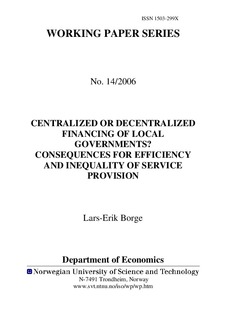| dc.contributor.author | Borge, Lars-Erik | nb_NO |
| dc.date.accessioned | 2014-12-19T14:31:36Z | |
| dc.date.available | 2014-12-19T14:31:36Z | |
| dc.date.created | 2007-01-18 | nb_NO |
| dc.date.issued | 2006 | nb_NO |
| dc.identifier | 121794 | nb_NO |
| dc.identifier.uri | http://hdl.handle.net/11250/267036 | |
| dc.description.abstract | Compared with most countries the Norwegian system of financing local governments is highly centralized. Grants make up a substantial part of revenues and local taxes are highly regulated by the center. The development of the system was motivated by a desire to equalize service provision throughout the country. The purpose of this paper is to analyze possible consequences of more decentralized financing with local tax discretion. Contrary to the conventional wisdom the analysis indicates that decentralized financing is likely to give more equal provision of local public services. In addition, substantial efficiency gains can be obtained. | nb_NO |
| dc.language | eng | nb_NO |
| dc.publisher | Norges teknisk-naturvitenskapelige universitet, Fakultet for samfunnsvitenskap og teknologiledelse, Institutt for samfunnsøkonomi | nb_NO |
| dc.relation.ispartofseries | Working Paper Series, 1503-299X; 2006:14 | nb_NO |
| dc.subject | Tax discretion | en_GB |
| dc.subject | Efficiency gains | en_GB |
| dc.subject | Equalization | en_GB |
| dc.subject | Centralized financing | en_GB |
| dc.subject | Decentralized financing | en_GB |
| dc.title | Centralized or decentralized financing of local governments? Consequences for efficiency and inequality of service provision | nb_NO |
| dc.type | Research report | nb_NO |
| dc.contributor.department | Norges teknisk-naturvitenskapelige universitet, Fakultet for samfunnsvitenskap og teknologiledelse, Institutt for samfunnsøkonomi | nb_NO |
